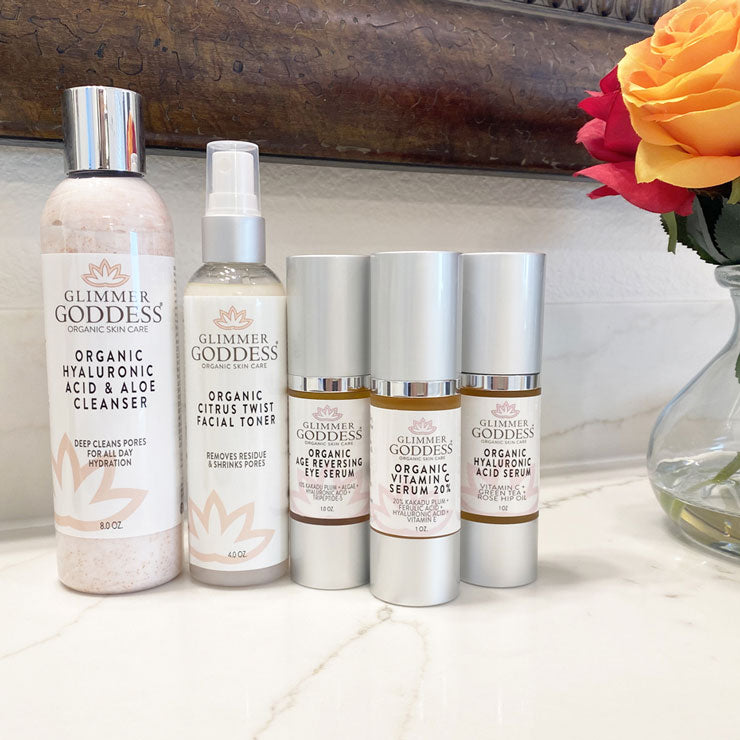
Natural vs Synthetic Vitamin C: The Ultimate Showdown for Radiant Skin
Vitamin C is a powerhouse ingredient known for its multitude of skin benefits, ranging from brightening and collagen production to anti-aging properties. However, choosing between natural and synthetic sources can be challenging. In this comprehensive guide, we explore the differences between natural and synthetic Vitamin C, their unique benefits, and how to incorporate them into your skincare routine to achieve radiant and youthful skin.
The Wonders of Vitamin C for Radiant, Youthful Skin
How Does Vitamin C Benefit Your Skin?
Vitamin C is a powerful antioxidant that offers a multitude of benefits for the skin. From boosting collagen production to brightening the complexion, this essential nutrient plays a crucial role in maintaining healthy, vibrant skin.
Vitamin C's Skin-Enhancing Properties:
- Stimulates collagen synthesis, which helps firm and plump the skin, reducing the appearance of fine lines and wrinkles.
- Neutralizes free radicals, protecting the skin from environmental stressors that can lead to premature aging.
- Inhibits melanin production, helping to fade dark spots and even out skin tone for a more radiant, luminous complexion.
- Enhances the skin's barrier function, locking in moisture and preventing transepidermal water loss for a healthier, more hydrated glow.
What is the Role of Antioxidants in Skin Health?
Antioxidants are the unsung heroes of skincare, working tirelessly to defend the skin against the damaging effects of oxidative stress. As one of the most potent antioxidants, vitamin C stands out as a true champion for skin health.
The Power of Antioxidants:
- Antioxidants neutralize free radicals, unstable molecules that can cause cellular damage and accelerate the aging process.
- By quenching these free radicals, antioxidants help prevent the breakdown of collagen and elastin, two crucial structural proteins that keep the skin firm and youthful.
- Antioxidants also have anti-inflammatory properties, soothing redness and irritation while promoting a healthy, balanced complexion.
- Regular use of antioxidant-rich products, like those containing vitamin C, can help protect the skin from environmental aggressors and maintain a radiant, glowing appearance.
Can Vitamin C Help with Aging and Skin Tone?
As we age, our skin becomes more susceptible to the ravages of time, with fine lines, wrinkles, and uneven pigmentation becoming more prominent. Vitamin C, however, has emerged as a powerful ally in the fight against visible signs of aging.
Vitamin C's Anti-Aging Benefits:
- Stimulates the production of collagen, the protein that gives skin its structural support and youthful bounce.
- Inhibits the enzyme tyrosinase, which is responsible for the production of melanin, helping to fade age spots and hyperpigmentation.
- Brightens the complexion and imparts a more even, radiant tone, diminishing the appearance of dullness and discoloration.
- Enhances the skin's barrier function, locking in moisture and preventing transepidermal water loss, which can contribute to premature aging.
What are the Differences in Vitamin C Sourcing?
When it comes to incorporating vitamin C into your skincare routine, the source of this essential nutrient can make a significant difference in its efficacy and stability. Understanding the various forms of vitamin C can help you choose the most effective option for your skin's unique needs.
Exploring Different Forms of Vitamin C:
- L-ascorbic acid: The most potent and bioavailable form of vitamin C, but also the most unstable and prone to oxidation.
- Ascorbyl palmitate: A lipid-soluble derivative of vitamin C that offers better stability and can penetrate the skin more effectively.
- Magnesium ascorbyl phosphate: A water-soluble form of vitamin C that is less prone to oxidation and better suited for sensitive skin types.
- Sodium ascorbyl phosphate: A stable, vitamin C derivative that is also less irritating and more suitable for acne-prone skin.
- Tetrahexyldecyl ascorbate: A highly stable, oil-soluble form of vitamin C that can provide long-lasting benefits without the risk of irritation.
Incorporating a well-formulated vitamin C serum or cream into your daily skincare routine can be a game-changer, offering a plethora of benefits for the skin. From boosting collagen production and neutralizing free radicals to fading discoloration and imparting a luminous glow, this versatile nutrient is a true skincare superstar. By understanding the different forms of vitamin C and choosing the one that best suits your skin's needs, you can unlock the secrets to radiant, youthful-looking skin.
The Power of Natural Vitamin C for Radiant Skin
What Sources of Natural Vitamin C Are Best for Your Skin?
Vitamin C is a powerhouse ingredient when it comes to skin health and beauty. While synthetic forms of vitamin C are commonly used in skincare products, natural sources of this essential nutrient can offer unique benefits for the skin.
Natural vitamin C can be found in a variety of fruits and vegetables, each with its own advantages.
- Citrus fruits like oranges, lemons, and limes are some of the most well-known natural sources of vitamin C. These fruits are packed with ascorbic acid, which is a highly bioavailable form of vitamin C that can effectively penetrate the skin.
- Berries, such as strawberries, raspberries, and blackberries, also contain significant amounts of vitamin C. In addition to their vitamin C content, berries are rich in antioxidants that can further support skin health.
- Acerola cherries are one of the most concentrated natural sources of vitamin C, containing up to 50 times more vitamin C than an orange. This makes them a potent choice for targeted skin care needs.
- Broccoli, bell peppers, and kiwi are other excellent natural sources of vitamin C that offer a range of additional nutrients and benefits for the skin.
Are There Any Limitations with Natural Vitamin C?
While natural vitamin C can be incredibly beneficial for the skin, it's important to understand that there are some potential limitations to consider.
Natural forms of vitamin C may have lower stability and shorter shelf life compared to synthetic versions.
- The ascorbic acid in natural vitamin C can be more sensitive to light, heat, and oxygen, which can cause it to degrade more quickly. This can make natural vitamin C products less shelf-stable and potentially less effective over time.
- The concentration of vitamin C in natural sources can also vary, making it harder to achieve consistent, high-potency formulations. This can be a challenge for those seeking targeted skin care benefits.
- Some natural vitamin C sources, like citrus fruits, can also be more irritating for those with sensitive skin due to their acidity. This may require some experimentation to find the right natural source that works well with your skin type.
How to Incorporate Natural Vitamin C into Your Skincare Routine?
Incorporating natural vitamin C into your skincare routine can be a game-changer for healthy, glowing skin. Here are some tips to help you get the most out of natural vitamin C.
Look for skincare products that utilize multiple natural sources of vitamin C for a synergistic effect.
-
Serums or moisturizers that combine different natural vitamin C sources, like citrus fruits and berries, can provide a more comprehensive and potent dose of this essential nutrient.
-
Consider using a natural vitamin C serum as a concentrated treatment, followed by a moisturizer that also contains natural vitamin C for a more sustained delivery throughout the day.
-
Exfoliating with a natural vitamin C-infused scrub or mask can help to enhance the absorption and effectiveness of your other vitamin C-based products.
-
Be mindful of the stability and shelf life of natural vitamin C products, and store them in a cool, dark place to help preserve their potency.
Is Natural Vitamin C Safer for All Skin Types?
While natural vitamin C can offer a gentler, more skin-friendly approach, it's important to note that not all skin types will react the same way.
Individuals with sensitive skin may find natural vitamin C sources to be less irritating than synthetic forms.
- The lower acidity and more gradual delivery of natural vitamin C can make it a better tolerated option for those prone to redness, dryness, or other sensitivities.
- That being said, it's still possible for some people to experience irritation or reactions to certain natural vitamin C ingredients, so it's always wise to patch test new products before full-face application.
- Those with oily or acne-prone skin may find that natural vitamin C helps to regulate sebum production and improve the overall health and appearance of their complexion.
By incorporating high-quality, natural sources of vitamin C into your skincare routine, you can unlock a world of benefits for your skin. From boosting collagen production and fading dark spots to enhancing radiance and protecting against environmental stressors, natural vitamin C is a true skin-saving superstar. With a little experimentation and attention to product stability, you can harness the power of nature's finest to achieve the glowing, youthful complexion you've been seeking.
The Remarkable World of Synthetic Vitamin C
What Is Synthetic Vitamin C and How Is It Made?
Vitamin C, also known as ascorbic acid, is an essential nutrient that plays a crucial role in maintaining our overall health. While vitamin C can be obtained from natural sources such as citrus fruits, berries, and vegetables, synthetic vitamin C has become increasingly popular in the world of skincare and dietary supplements.
Synthetic vitamin C is a laboratory-produced version of the natural vitamin C found in nature. It is made through a chemical process that involves the conversion of various raw materials, such as glucose or other carbohydrates, into the final ascorbic acid product.
- The manufacturing process typically involves a series of chemical reactions, including oxidation, reduction, and purification steps, to ensure the purity and stability of the final product.
- Synthetic vitamin C is designed to be chemically identical to the natural vitamin C, with the same molecular structure and chemical properties.
- One of the main advantages of synthetic vitamin C is its ability to be produced in large quantities and at a lower cost compared to natural sources, making it more accessible and affordable for consumers.
What Are the Benefits of Using Synthetic Vitamin C in Skincare Products?
Vitamin C is widely recognized for its numerous benefits, not only for our overall health but also for our skin. When it comes to skincare, synthetic vitamin C has become a popular ingredient in a wide range of products, from serums and creams to cleansers and masks.
Synthetic vitamin C offers a range of beneficial effects for the skin, making it a valuable addition to many skincare formulations.
- Antioxidant protection: Vitamin C is a powerful antioxidant that helps to neutralize harmful free radicals, which can cause oxidative stress and accelerate the aging process of the skin.
- Brightening and even skin tone: Vitamin C inhibits the production of melanin, the pigment responsible for dark spots and uneven skin tone, helping to brighten and even out the complexion.
- Collagen production: Vitamin C is essential for the synthesis of collagen, a protein that provides structure and elasticity to the skin, helping to reduce the appearance of fine lines and wrinkles.
- Improved skin barrier function: Vitamin C can help to strengthen the skin's natural barrier, protecting it from environmental stressors and maintaining optimal hydration levels.
Are There Any Risks Associated with Synthetic Vitamin C?
While synthetic vitamin C is generally considered safe and effective, it's important to be aware of potential risks and considerations when using it in skincare products.
Although rare, some individuals may experience minor side effects when using synthetic vitamin C:
- Skin irritation: Some people may experience mild irritation, redness, or tingling sensation, especially when using highly concentrated formulations or when the skin is sensitive.
- Photosensitivity: Vitamin C can increase the skin's sensitivity to UV radiation, so it's important to use sunscreen when using products containing synthetic vitamin C.
- Stability concerns: Synthetic vitamin C can be unstable and degrade when exposed to light, air, or certain pH levels, which may affect its efficacy and potency over time.
To minimize these risks, it's recommended to follow the instructions on the product label, start with a lower concentration, and discontinue use if any adverse reactions occur. It's also important to store synthetic vitamin C products properly to maintain their stability and effectiveness.
How to Choose the Right Synthetic Vitamin C Product?
When it comes to incorporating synthetic vitamin C into your skincare routine, it's essential to choose the right product that suits your skin type and needs. Here are some key factors to consider when selecting a synthetic vitamin C product:
Concentration: Look for products that contain a concentration of synthetic vitamin C between 10-20%, as this is generally considered the optimal range for effective results without causing excessive irritation.
Formulation: Pay attention to the overall formulation of the product, as the inclusion of other ingredients like vitamin E, ferulic acid, or hyaluronic acid can enhance the benefits of synthetic vitamin C.
Stability: Choose products that have been formulated to maintain the stability of the synthetic vitamin C, such as those that are packaged in opaque or dark-colored containers to protect the ingredient from light exposure.
Skin type: Consider your skin type and any other skin concerns you may have, and select a synthetic vitamin C product that is specifically designed for your individual needs, whether that's for sensitive, acne-prone, or aging skin.
Brand reputation: Research the brand and look for reputable companies with a track record of producing high-quality, safe, and effective skincare products containing synthetic vitamin C.
By keeping these factors in mind, you can find the right synthetic vitamin C product that will deliver the desired benefits for your skin, while also minimizing any potential risks or side effects. Incorporating this powerful ingredient into your skincare routine can be a game-changer in achieving a brighter, more youthful, and healthier complexion.
Q&A
What are the key differences between natural and synthetic Vitamin C?
Natural Vitamin C comes from food sources like fruits and vegetables, while synthetic Vitamin C is artificially created in laboratories. Natural sources may offer additional antioxidants, but synthetic forms can be more stable and cheaper to produce.
Which Vitamin C is better for sensitive skin?
Natural Vitamin C may be gentler on sensitive skin due to its lower acidity and gradual delivery. However, patch testing is recommended for any new product.
Can Vitamin C help with acne?
Yes, Vitamin C can help regulate sebum production and reduce inflammation, benefiting those with acne-prone skin. Both natural and synthetic forms can be effective.
How do I store Vitamin C products to maintain their potency?
Keep Vitamin C products in a cool, dark place, and ensure they are stored in opaque containers to protect them from light and oxidation, which can degrade the ingredient.
Is natural Vitamin C more effective than synthetic?
Both natural and synthetic Vitamin C can be effective, but their efficacy may vary based on concentration, formulation, and individual skin types. It's important to choose the right product for your specific needs.
Choosing the right Vitamin C—whether natural or synthetic—can significantly impact your skin health and appearance. Both sources have their unique advantages, and with proper knowledge, you can tailor your skincare routine to maximize benefits. Embrace the power of Vitamin C for achieving radiant, youthful skin, and enjoy the confidence that comes with it.








